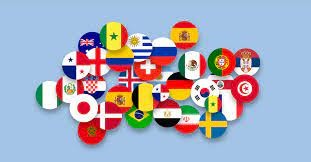
In multilingual contexts, I must say that people didn't tend to keep their L1 pronunciation when speaking English. Some might argue that they do not want to fake an English pronunciation, because losing their native accent represses their identity, but it was true that all the people I spoke to in the Polyglot Gathering had abandoned their L1 accent in favour of an English-sounding pronunciation. Rather than by accent, one’s national identity is more likely displayed by gestures, stories, clothes or even names. Actually, the fluenter the speaker, the more standard their pronunciation.
An exception is probably the case of India and few other places where English is a second official language and has evolved independently and autonomously from British, American or Australian English, which are the most accredited variations today. So, it can be said that Indian English is a detached variety with its own pronunciation features that differ from the Received Pronunciation standard.
The Polyglot Gathering event was not only interesting from a linguistic point of view, but also from a sociological one. I’ve had the opportunity to discover new cultures and I was amazed to observe that, depending on the spoken language, the speakers’ attitudes were different.
They all tended to adopt aspects of the culture of the foreign language they spoke. In this respect, the atmosphere in German practice rooms was usually quite and everyone waited for their turn to talk. In Spanish practice rooms, instead, the situation was completely different, people spoke louder and more quickly, you had to talk over others if you wanted to be heard. Also, the atmosphere was more frantic and welcoming. I hinted at this subject once, and a Domican girl replied: “You’re right, I’ve always noticed that when I speak Spanish I laugh more”.
I think that this is all very fascinating and it is somehow a demonstration of the Linguistic Relativity Theory, according to which the language we speak affects at some extent the way we think, express ourselves and eventualy perceive reality. When we switch to another language, we yield to its cultural baggage and take on some of its features.
In conclusion, I’d say that for those who are interested in languages, experiences like this one are fundamental. Learning foreign languages without having hands-on experience is reductive, even paradoxical, because it deprives the learner of all other important aspects – culture, interplay between languages, linguistic contamination and variation… – which make people understand others better and feel like part of a global community.
I read both of your texts Elsa and the conference sounds amazing! I will for sure take part in it next year, I can't believe I missed it this year :)
I'm so happy to read this! See you next year then ;)
The paragraph about German and Spanish was very interesting ;) I didn't take part in this year even if I was signed up. But I'm going to take part in the real-world event the next year.
Thanks mate! I bet it is a completely different experience when it's in persona
Being newly acquainted to the polyglot community, I found your observations fascinating. I'd also add that context is important in how one's accent is perceived. I had a linguistics professor, of Chinese ancestry, who prided himself on his perfect Swedish. But when he and his Swedish wife travelled together in Sweden and he asked for directions he was amused that they invariably responded to his wife.